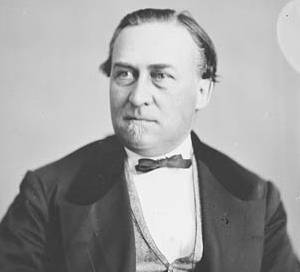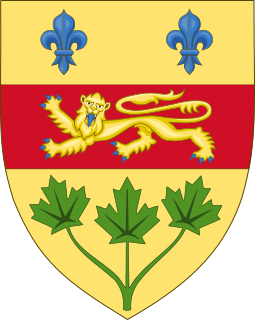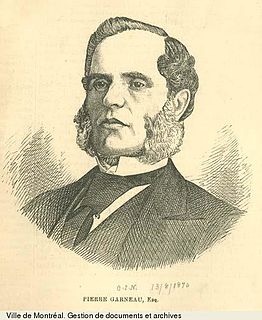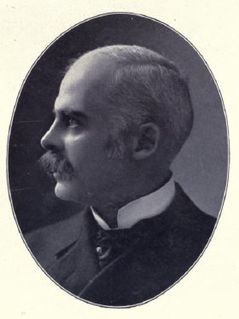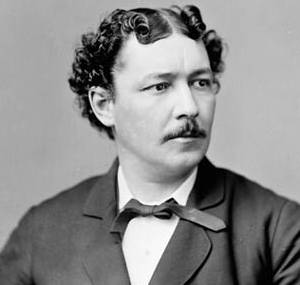Thomas Savage M.L.C. | |
|---|---|
| Member of the Legislative Council of Quebec | |
| In office November 19, 1873 –February 26, 1887 | |
| Preceded by | John LeBoutillier |
| Succeeded by | David Alexander Ross |
| Constituency | Gulf Division |
| Personal details | |
| Born | September 16, 1808 Jersey, Channel Islands |
| Died | November 21, 1887 (aged 79) Anse-du-Cap, Quebec |
| Political party | Conservative |
| Spouse(s) | Julie Colin-Laliberté |
| Profession | Businessman and shipowner |
Thomas Savage (September 16, 1808 - November 21, 1887) was a merchant, shipowner and politician in the province of Quebec, Canada. He served in the Legislative Council of Quebec, the upper house of the Legislature of Quebec.

The Legislative Council of Quebec was the unelected upper house of the bicameral legislature in the Canadian province of Quebec from 1867 to 1968. The Legislative Assembly was the elected lower house.
An upper house is one of two chambers of a bicameral legislature, the other chamber being the lower house. The house formally designated as the upper house is usually smaller and often has more restricted power than the lower house. Examples of upper houses in countries include the Australian Senate, Brazil's Senado Federal, the Canadian Senate, France's Sénat, India's Rajya Sabha, Ireland's Seanad, Malaysia's Dewan Negara, Myanmar's Amyotha Hluttaw, the Netherlands' Eerste Kamer, Pakistan's Senate of Pakistan, Russia's Federation Council, Switzerland's Council of States, United Kingdom's House of Lords, and the United States Senate.
Savage was born on Jersey in the Channel Islands, the son of Jean Savage and Elizabeth Degnesley. Raised at Jersey, at some point he emigrated to Canada.

Jersey, officially the Bailiwick of Jersey, is a British Crown dependency located near the coast of Normandy, France. It is the second closest of the Channel Islands to France, after Alderney.

The Channel Islands are an archipelago in the English Channel, off the French coast of Normandy. They include two Crown dependencies: the Bailiwick of Jersey, which is the largest of the islands; and the Bailiwick of Guernsey, consisting of Guernsey, Alderney, Sark and some smaller islands. They are considered the remnants of the Duchy of Normandy and, although they are not part of the United Kingdom, the UK is responsible for the defence and international relations of the islands. The Crown dependencies are not members of the Commonwealth of Nations nor of the European Union. They have a total population of about 164,541, and the bailiwicks' capitals, Saint Helier and Saint Peter Port, have populations of 33,500 and 18,207, respectively.
He became a merchant and ship owner at l'Anse-du-Cap, in the Gaspé region. He was a major in the local militia. On April 4, 1847, he married Julie Colin-Laliberté.
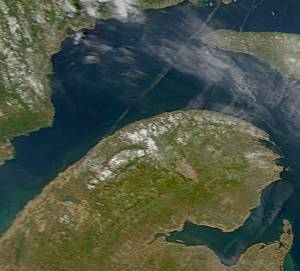
The Gaspésie, or Gaspé Peninsula, the Gaspé or Gaspesia, is a peninsula along the south shore of the Saint Lawrence River to the east of the Matapedia Valley in Quebec, Canada, that extends into the Gulf of Saint Lawrence. It is separated from New Brunswick on its southern side by the Baie des Chaleurs and the Restigouche River. The name Gaspé comes from the Mi'kmaq word gespe'g, meaning "end", referring to the end of the land.
Savage stood for election to the Legislative Assembly of the Province of Canada in the general election of 1863 but was defeated. In 1873, he was appointed to the Legislative Council for the Gulf division, as a supporter of the Conservative party of Quebec. He held that position for nearly fourteen years until his resignation in February 1887.
The Legislative Assembly of the Province of Canada was the lower house of the legislature for the Province of Canada, which consisted of the former provinces of Lower Canada, then known as Canada East and later the province of Quebec, and Upper Canada, then known as Canada West and later the province of Ontario. It was created by The Union Act of 1840. Canada East and Canada West each elected 42 members to the assembly. The upper house of the legislature was called the Legislative Council.
The Conservative Party of Quebec was a political party in Quebec, Canada, from 1867 until 1936, when it merged with members of the Action libérale nationale to form the Union Nationale.
Savage died at l'Anse-du-Cap in November, 1887.
